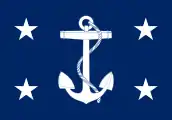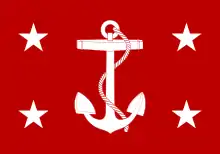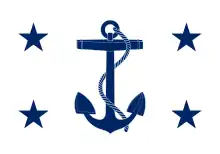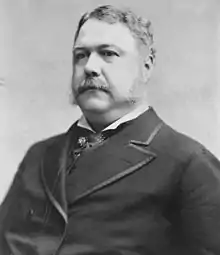William E. Chandler
William Eaton Chandler (December 28, 1835 – November 30, 1917) was a lawyer who served as United States Secretary of the Navy and as a U.S. Senator from New Hampshire.
William Chandler | |
|---|---|
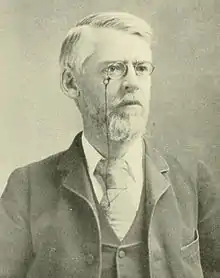 | |
| United States Senator from New Hampshire | |
| In office June 14, 1887 – March 3, 1889 | |
| Preceded by | Person Cheney |
| Succeeded by | Gilman Marston |
| In office June 18, 1889 – March 3, 1901 | |
| Preceded by | Gilman Marston |
| Succeeded by | Henry E. Burnham |
| 30th United States Secretary of the Navy | |
| In office April 16, 1882 – March 4, 1885 | |
| President | Chester A. Arthur |
| Preceded by | William H. Hunt |
| Succeeded by | William Whitney |
| Personal details | |
| Born | William Eaton Chandler December 28, 1835 Concord, New Hampshire, U.S. |
| Died | November 30, 1917 (aged 81) Concord, New Hampshire, U.S. |
| Political party | Republican |
| Spouse(s) | Ann Gilmore Lucy Lambert Hale |
| Children | 1 |
| Education | Harvard University (LLB) |
| Signature | |
Early life
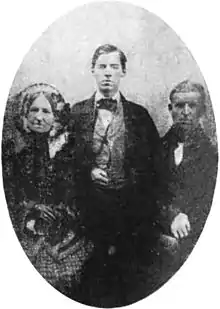
William E. Chandler was born in Concord, New Hampshire to Nathan S. Chandler and Mary Ann (Tucker) Chandler. William's elder brother, John Chandler, was a successful East India merchant and his younger brother George Chandler, an attorney who served as a major during the Civil War.[1]
William Chandler attended the common schools, Thetford Academy and Pembroke Academy before attending Harvard Law School, where he began a romantic correspondence with Lucy Lambert Hale, daughter of Senator John Parker Hale. He graduated in 1854, was admitted to the bar in 1855, and commenced practice in Concord.[2]
In 1859 Chandler married Ann Gilmore, the daughter of Governor Joseph A. Gilmore. In 1874, after his first wife's death, Chandler resumed his romance with Lucy Hale, who had been secretly betrothed in 1865 to John Wilkes Booth, Abraham Lincoln's assassin. Chandler and Hale were married in 1874, and in March 1875, their only son, John Parker Hall Chandler, was born.[3]
Political career
In 1859, Chandler was appointed reporter of the decisions of the Supreme Court of New Hampshire. He then served in the New Hampshire House of Representatives from 1862 to 1864 and was the Speaker during the last two years.[1][4]
In 1865, Chandler was appointed by President Abraham Lincoln solicitor and judge advocate general of the Navy Department. Subsequently, he was appointed First Assistant Secretary of the Treasury, until he resigned in 1867.[1]
Chandler returned to New Hampshire and became a newspaper publisher and editor during the 1870s and 1880s. Continuing in politics, he was a member of the State constitutional convention in 1876 and a member of the State house of representatives in 1881.[1] Chandler was appointed by President Chester A. Arthur as Secretary of the Navy in 1882. He took charge in 1883 in planning for the rescue of Lt. Adolphus Greely's Lady Franklin Bay Expedition. Chandler served until 1885.
As a Republican, he was elected to the United States Senate to fill the vacancy caused by the death of Austin F. Pike and served from June 14, 1887, to March 3, 1889. Subsequently, elected for the term beginning March 4, 1889, he was reelected in 1895 and served from June 18, 1889, to March 3, 1901. He was an unsuccessful candidate for renomination. He served as chairman of the Committee on Immigration (Fifty-first and Fifty-second Congresses), Committee on Census (Fifty-fourth Congress), Committee on Privileges and Elections (Fifty-fifth and Fifty-sixth Congresses).
In 1892, Chandler proposed a one-year ban on immigration, to keep out undesirables, which included cholera carriers, Anarchists, Nihilists, polygamists, Mafia members, illiterates, "blind or crippled" persons, persons without means, etc.[5] Among the solutions Chandler proposed for addressing the "evils which have been made apparent by the vast increase, within recent years, of degraded immigrants from Italy, Turkey, Hungary, Poland and Russia proper" were the addition of an educational requirement and property qualification for all persons or families seeking to emigrate to the United States.[6] The strongest opponents of the bill were the steamship companies, who stood to lose a major portion of their business.[7] A watered-down version of The Chandler Immigration and Contract Labor Bill became law on March 3, 1893. It simply required steamship companies to prepare lists of their passengers containing full information,[8][9] and thus very likely served as a compromise to get the steamship companies to back down on Immigration Reform at this time.
Chandler was appointed by President William McKinley to the Spanish Treaty Claims Commission in 1901. He was the president of the Commission from its inception until 1907, when its work was nearly complete.
In 1907, Chandler served as the lead counsel during the Next Friend's Suit, a legal challenge over the estate of Mary Baker Eddy, the leader of Christian Science church. The trial was headline news across the country.[10]
Leaving public office, Chandler resumed the practice of law in Concord and Washington, D.C..
He died at Concord in 1917 and was buried in Blossom Hill Cemetery in Concord.[11]
Legacy
USS Chandler (DD-206) was named for him.
Chandler's grandson, Theodore E. Chandler joined the U.S. Navy in 1911 while his grandparents were both still alive and later distinguished himself as a rear admiral in World War II. While aboard the cruiser USS Louisville, he was killed in action by a Japanese kamikaze aircraft during the Battle of Lingayen Gulf in January 1945.
References
- John Badger Clarke, Sketches of successful New Hampshire men... (J.B. Clarke, 1882) pp. 261-265
- The New England magazine, Volume 36, "What's Doing at Washington" by David S. Barry, New England Magazine Co., (1907) p. 261
- Kunhardt, Dorothy and Philip, Jr. (1965). Twenty Days. North Hollywood, Calif.: Newcastle. pp. 178–179. LCCN 62015660.CS1 maint: multiple names: authors list (link)
- Jenks, George E. (1866), Political Journal for the State of The New Hampshire 1867, Concord, New Hampshire: McFarland and Jenks, p. 45
- See, for example, "To Control Immigration: Four More Classes of Excluded Persons Proposed". The New York Times. Washington. January 5, 1893. p. 3. Retrieved January 7, 2021 – via Newspapers.com.
- "Shall Immigration Be Suspended?", North American Review No. 434, January 1893, p. 7.
- See, for example, "Prohibition of Immigration: Opposition of the Steamship Companies to the Chandler Bill". The New York Times. Washington. December 12, 1892. p. 4. Retrieved January 7, 2021 – via Newspapers.com.
- "The New Immigration Bill". The New York Times. Washington. March 4, 1893. p. 9. Retrieved January 7, 2021 – via Newspapers.com.
- "(Untitled editorial)". The New York Times. March 5, 1893. p. 4. Retrieved January 7, 2021 – via Newspapers.com.
- "How Factual Evidence Subdued Tabloid Fiction in the Next Friends Suit of 1907". Longyear Museum.
- "Hon. W. E. Chandler Dead". The Boston Globe. Concord, New Hampshire. November 30, 1917. p. 4. Retrieved January 7, 2021 – via Newspapers.com.
External links
| Wikimedia Commons has media related to William Eaton Chandler. |
- United States Congress. "William E. Chandler (id: C000298)". Biographical Directory of the United States Congress.
- This article incorporates text from the public domain Dictionary of American Naval Fighting Ships.
| Wikisource has original works written by or about: William E. Chandler |
| Government offices | ||
|---|---|---|
| Preceded by William H. Hunt |
United States Secretary of the Navy 1882–1885 |
Succeeded by William C. Whitney |
| U.S. Senate | ||
| Preceded by Person C. Cheney |
U.S. senator (Class 2) from New Hampshire 1887–1889 Served alongside: Henry W. Blair |
Succeeded by Gilman Marston |
| Preceded by Gilman Marston |
U.S. senator (Class 2) from New Hampshire 1889–1901 Served alongside: Henry W. Blair, Jacob H. Gallinger |
Succeeded by Henry E. Burnham |
| Political offices | ||
| Preceded by Edward A. Rollins |
Speaker of the New Hampshire House of Representatives 1863–1864 |
Succeeded by Austin F. Pike |
